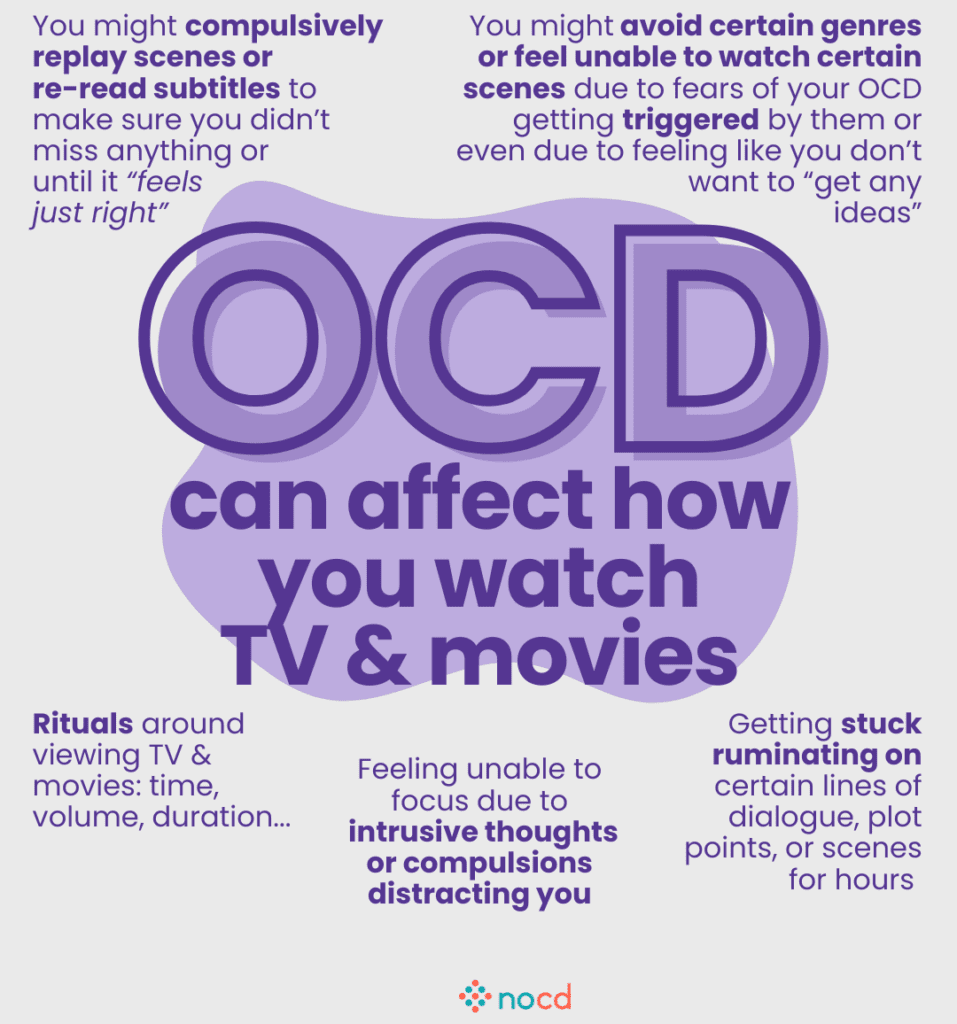You’re ready to relax, curl up on the couch, and watch a movie—only to feel the stress creeping in the moment you start scrolling through options. What should be a cozy, peaceful experience suddenly becomes an exhausting process of decision-making. You might spend an hour scrolling and researching before giving up entirely.
Or, maybe you’re excited to watch a movie with friends, but as soon as it starts, you find yourself wondering, Are they enjoying it as much as I am? Was this a bad choice? The whole time, you’re stuck in a loop of second-guessing and overthinking.
If this sounds familiar, you’re not alone. In fact, these kinds of thoughts are more common than you might realize. We spoke with Dr. Patrick McGrath, Chief Clinical Officer at NOCD, to learn more about why movies can spark feelings of stress and anxiety—and what you can do to find relief.
Why do movies make me stressed?
Movies are meant to be an escape—a way to unwind, get lost in a story, and take a break from reality. But for many, movies can unexpectedly turn into a source of stress. The pressure to choose the “right” film or worry over how others will react can quickly make a relaxing activity feel tense.
Choosing movies
For some, picking a movie becomes an exhausting task instead of a fun choice. Dr. McGrath describes this experience as decision fatigue, where even simple choices become overwhelming. He compares it to ordering a new dish at a restaurant: “People want to know how everything’s going to be before they choose it, and then they don’t want to choose it unless they know how it is, and that gets in the way of them really living their life.” Similarly, when choosing movies, people want to make sure they make the perfect decision or love whatever they end up watching, even though there is no guarantee.
People want to know how everything’s going to be before they choose it, and then they don’t want to choose it unless they know how it is, and that gets in the way of them really living their life.
Dr. Patrick McGrath
When anxious thoughts or perfectionist tendencies take over, it can turn a low-key activity into an experience filled with pressure and doubt. Recognizing that these feelings are common—and not a reflection of the “right” or “wrong” way to enjoy movies—can help you approach them with more ease. And sometimes, letting go of the need for the “perfect” choice might just be the key to relaxing after all.
Is my movie anxiety related to a mental health condition?
For some people, stress around movies is significant and interferes with their quality of life, and can be linked to specific phobias, obsessive-compulsive disorder (OCD), or even generalized anxiety. In these cases, the worry around making the “wrong” choice or encountering something uncomfortable can turn watching a movie into a source of dread. Understanding how these conditions play a role can help make sense of why movie-related anxiety feels so intense.
Obsessive-compulsive disorder (OCD)
OCD is a mental health condition marked by intrusive thoughts, images, urges, and feelings that cause distress. People with OCD respond to these obsessions by performing rituals, known as compulsions, which may include physical actions or mental exercises performed to relieve the anxiety from the obsessions temporarily. Unfortunately, this relief doesn’t last long, creating a continuous cycle of obsessions and compulsions that can feel impossible to break free from.
For those with OCD, the need for certainty and control can turn movie-watching into something stressful instead of fun. Dr. McGrath explains how OCD amplifies the fear of “wasting time” on a movie you might not like: “OCD says, ‘What if you watch this movie and spend two hours on it, and then you don’t like it, and then you wasted two hours of your life? You’ll never get that back and that would be terrible.’” So instead of just picking a movie, you might find yourself spending hours researching and scrolling, all to avoid making the “wrong” choice, which can feel exhausting before you even hit play.
Even after the choice is made, watching a movie can bring on its own set of worries, especially if you’re watching with others. Dr. McGrath highlights how fears about other people’s enjoyment can spiral: “If other people are watching it with you, [you may wonder] how are they liking it? What if I chose something they don’t like? If I wasted their time now, will they hate me because I made this decision?” Instead of feeling relaxed, you might be caught in a loop of worry and self-doubt.
ERP for OCD
To manage these challenges, exposure and response prevention (ERP) therapy is considered the gold standard treatment for OCD. ERP helps individuals confront their distressing thoughts without relying on compulsive behaviors for temporary relief. In the context of movie-related anxiety, ERP would involve gradually facing the anxiety around picking a movie and committing to watching it, even if there’s uncertainty about whether it will be “worth it.”
Dr. McGrath suggests a practical ERP approach he calls the scroll game. “Go four clicks down, five clicks to the right, that’s the movie you’re gonna watch. And just watch it, whether you like it or not, just be with that experience and watch it,” he explains. This technique is about learning to handle the discomfort that it might be bringing for you and trusting that you can sit with the uncertainty of not knowing whether the movie will be worth it or not.
Over time, ERP empowers you to deal with situations that feel uncertain, like picking a movie or simply enjoying the experience without overthinking. By gradually exposing yourself to these situations and resisting compulsions, you can reclaim a sense of ease and enjoyment in activities that OCD often complicates.
Phobias
Phobias are intense, overwhelming fears of specific situations, objects, or experiences, and they can feel way out of proportion to any actual danger.
When it comes to movies, certain phobias can make watching a film feel risky, especially if there’s a chance of unexpected triggers. “Some people will want to know that there’s nothing that they’re phobic about in a film. You may always watch movies hoping to not see something that you might be afraid of,” says Dr. McGrath.
For example, someone who is afraid of throwing up might watch every movie on edge, hoping there isn’t a scene that includes vomiting, even though the movie has nothing to do with that occurring.
Treatment for phobias
In treating phobias, a therapist might use a gradual approach to help clients build tolerance to their specific fears through methods like ERP. Dr. McGrath describes a therapeutic strategy that is standard in ERP—working with individuals in a controlled environment so that, over time, the feared situation feels more manageable.
For example, say someone feels triggered by scenes of high places like mountains and rooftops. A therapist might guide them to first watch short clips with mild height-related scenes in a safe, supportive setting. This way, they learn to sit with the discomfort, building resilience little by little. Over time, this approach can make them feel more prepared and confident if similar scenes come up unexpectedly in a movie they are watching. By practicing this process in therapy, clients can build resilience and feel more prepared if they encounter a trigger in a real-world movie setting.
Tips for avoiding movie anxiety
One approach to watching movies to ease into the experience by starting with shorter media. For instance, if a full movie feels like too much of a commitment, you might begin by watching a short film or an episode of a TV show instead. Building up slowly in this way can help you become more comfortable with watching content without needing certainty about every detail or outcome.
Another useful tip is to reframe the idea of “wasting time.” Often, the fear of picking the “wrong” movie can feel like a fear of losing time you can’t get back. Dr. McGrath encourages shifting this mindset: “You willingly spend eight hours of time trying to figure something out, but you’re not willing to take a chance and have a two-hour ‘waste of time’ that might actually be enjoyable.” This perspective helps remind us that even if the movie isn’t perfect, it’s okay to spend time in the experience without overthinking the value of every moment.
You willingly spend eight hours of time trying to figure something out, but you’re not willing to take a chance and have a two-hour ‘waste of time’ that might actually be enjoyable.
Dr. Patrick McGrath
Finally, if worries about others’ reactions add pressure, consider letting go of the need to control. By releasing this responsibility, you’re better able to relax and enjoy the moment yourself. Instead of feeling accountable for everyone’s enjoyment, focus on giving yourself permission to just be present and let others have their own experience.
Bottom line
Movies are meant to be a way to relax and temporarily escape, but if the process of choosing or watching one feels more stressful than enjoyable, you’re not alone. Many people find that what should be a simple activity can quickly spiral into anxious thoughts or a need to control every aspect of the experience. If you love movies but feel overwhelmed by these reactions, it’s okay—these feelings are surprisingly common and nothing to feel ashamed of.
There’s no “perfect” way to enjoy movies, and everyone’s experience is different. Learning to approach movie-watching with more ease, whether through small changes or working with a therapist, can help bring back the simple joy that movies are meant to offer. By letting go of the need for control and embracing the moment, you can start to reclaim the fun and relaxation you’ve been hoping for.


